Key takeaways:
- VPNs provide privacy by encrypting data and masking IP addresses, enhancing security against online threats like hackers and identity thieves.
- Choosing a reliable VPN involves looking for user trust, strong security features, and responsive customer support.
- Recommendations for VPNs include ExpressVPN for speed, NordVPN for security, and Surfshark for budget-friendly options with unlimited devices.
- Practical tips for using VPNs include selecting nearby servers, enabling the kill switch feature, and regularly clearing the DNS cache to maintain privacy.
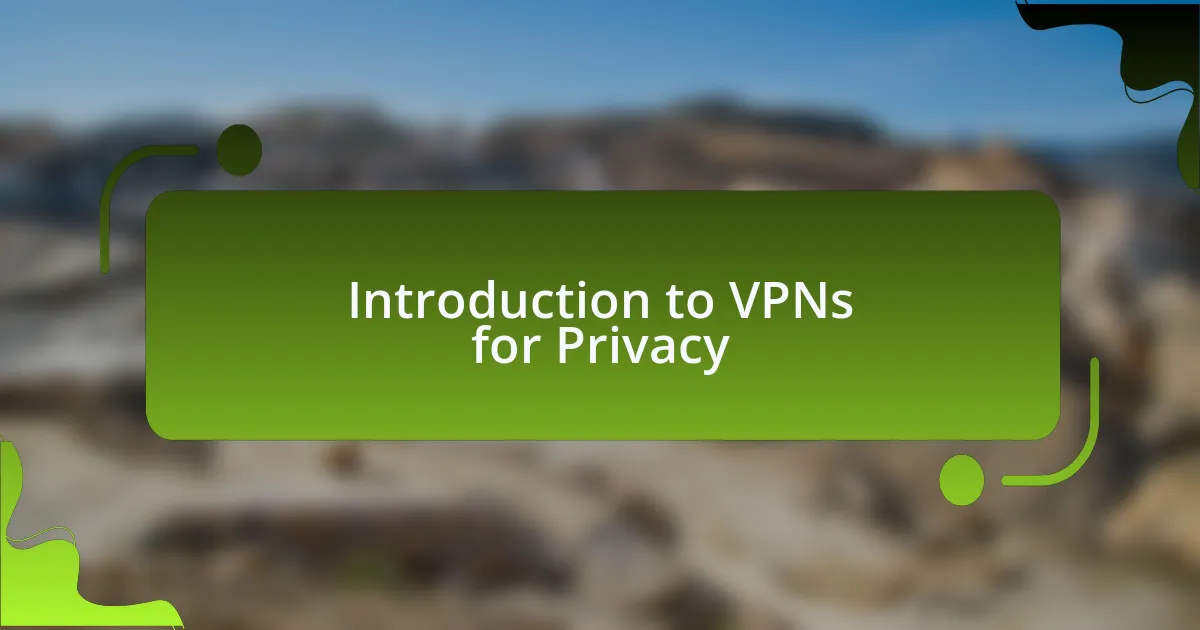
Introduction to VPNs for Privacy
When I first learned about VPNs, I was intrigued by their ability to cloak online activities and protect personal data. Imagine browsing the web without the constant fear of being tracked; it was a game changer for me. That sense of security allowed me to explore more freely, knowing my privacy wasn’t dangling in the open.
VPNs, or Virtual Private Networks, create a secure tunnel for your data as it travels across the internet. This means that whether you’re streaming your favorite shows or handling sensitive transactions, your online footprint can be largely hidden from prying eyes. It’s like having a private suite in a bustling hotel—no one can peek in at what you’re doing.
I often find myself asking, “How much is my privacy worth?” For me, it’s invaluable. Every time I click ‘send’ on an email or input my credit card information, I want that data safeguarded. VPNs offer me that peace of mind, and honestly, in this digital age, I believe everyone should consider investing in their privacy the same way they would protect their financial assets.
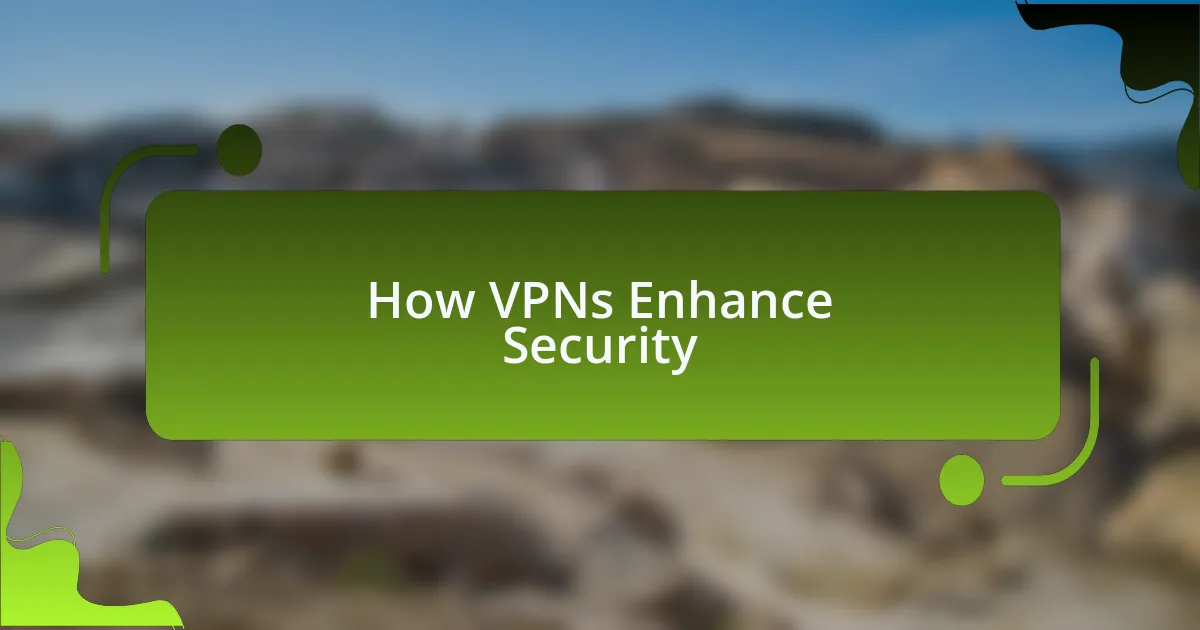
How VPNs Enhance Security
When I think about the threats lurking online, such as hackers and identity thieves, it’s clear how vital VPNs are for security. They work by encrypting user data, transforming it into unreadable code—even if a malicious actor intercepts it, they won’t be able to decipher a thing. This level of encryption gives me confidence, especially when I’m connecting to public Wi-Fi networks at coffee shops or airports.
I once experienced a situation where my information was exposed while using a public network, and it shook me. Since then, I’ve turned to VPNs to further secure my connection. Knowing that my internet activity is encapsulated in this fortress of encryption makes me feel like I’m armored against digital threats whenever I go online.
VPNs also allow me to mask my IP address, which is another layer of security I genuinely appreciate. It’s like wearing a disguise while browsing—nobody can easily pinpoint my location or monitor my online behavior. In today’s climate, where data privacy feels increasingly elusive, this capability of VPNs gives me a sense of control over my digital identity that I value immensely.
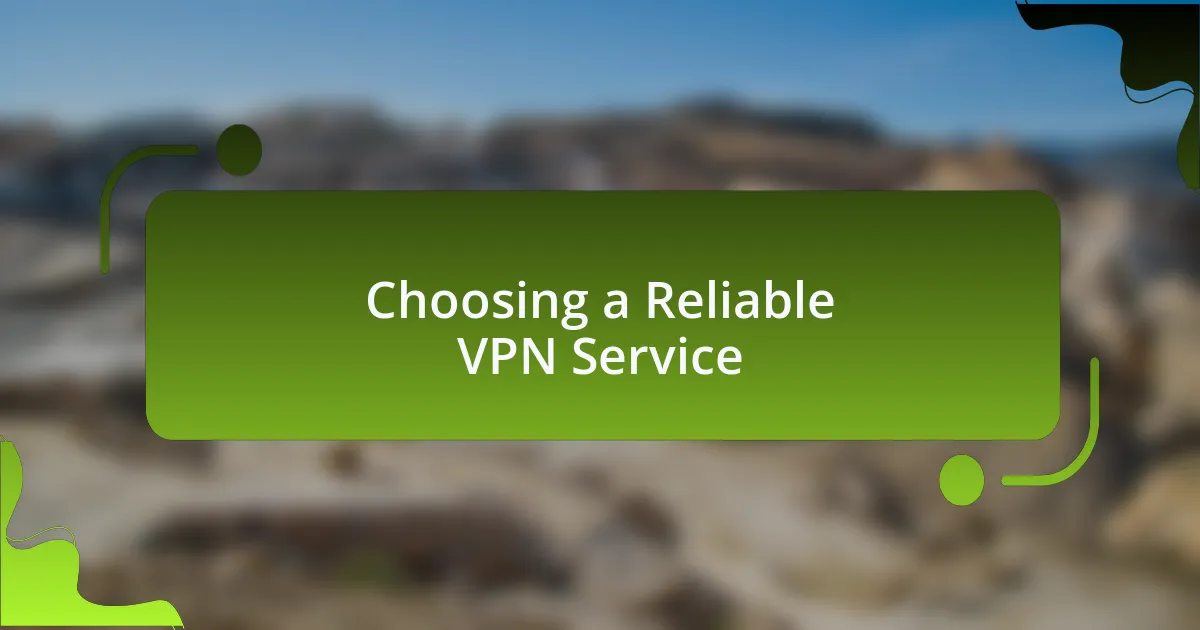
Choosing a Reliable VPN Service
When selecting a reliable VPN service, I always look for a strong track record of user trust and transparency. I remember the first time I chose a VPN provider; I spent hours reading reviews and scanning user testimonials. It was crucial for me to find a service that genuinely respects user privacy and doesn’t sell data to third parties. How often do you rely on recommendations? I believe they can steer you toward credible options.
Another key factor for me is the presence of robust security features, such as strong encryption protocols and a no-logs policy. The peace of mind that comes with knowing my data isn’t being tracked or stored is invaluable. I once made the mistake of overlooking this detail and endured sluggish performance as a result. Every time I connected, I felt a nagging concern about my privacy slipping away; it was a lesson learned.
Lastly, I can’t stress enough the importance of customer support. Imagine facing connectivity issues at midnight when you finally have time to enjoy some online activity—having responsive and knowledgeable support can make all the difference. I once encountered a frustrating problem late at night, and the quick help I received turned my experience around. Choosing a VPN that prioritizes customer service makes a significant impact, ensuring that users feel supported anytime they need assistance.
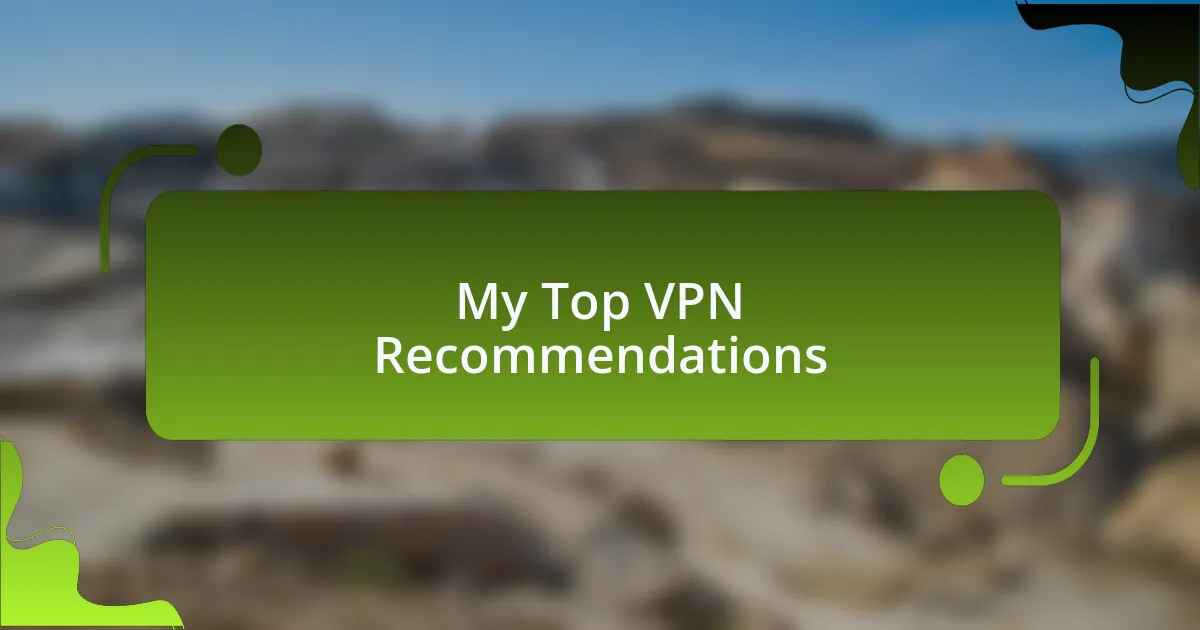
My Top VPN Recommendations
When it comes to my top VPN recommendations, I can’t help but mention ExpressVPN. This service has consistently impressed me with its fast speeds and easy-to-use interface. I remember a time when I had to access geo-restricted content for a project; ExpressVPN made it seamless. It was a game-changer, allowing me to focus on my work rather than worry about connectivity or buffering.
Another favorite of mine is NordVPN, which stands out for its strict no-logs policy and advanced security features. There was a phase when I was uncertain about my online privacy, and using NordVPN gave me a sense of security unlike anything I’d experienced before. The double VPN feature felt like an extra layer of armor, and I found myself exploring sites I had previously avoided, finally at ease knowing my data was protected.
Lastly, I often recommend Surfshark, especially for those on a budget. Their unlimited device policy struck a chord with me, as I realized I could protect all my gadgets with just one subscription. There was a moment when I had friends over, and we all jumped on our devices for a movie night. The ability to connect and use Surfshark on multiple devices simultaneously was a hit. It made me appreciate how the right VPN can enhance both my personal and social experiences online.
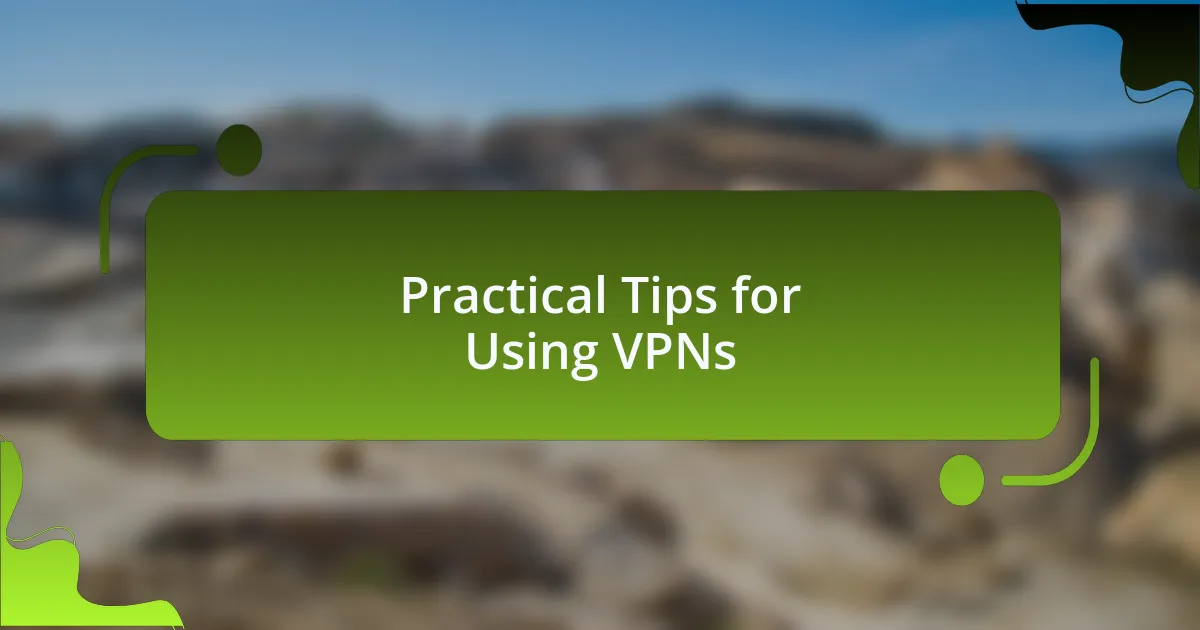
Practical Tips for Using VPNs
One key tip I’ve learned over time is to always choose a server that is geographically close to you. I once tried connecting to a server far from my location, and the result was a frustratingly slow connection. It made me realize how vital it is to balance speed and privacy; being close to the server can significantly enhance your browsing experience.
Another practical tip is to enable the kill switch feature wherever possible. There was a time when my VPN unexpectedly disconnected, and that’s when I wished I had enabled that feature. The kill switch ensures that if your VPN connection drops, your internet access is cut off, preventing any exposure of your real IP address. It’s a small adjustment, but it can make a huge difference in safeguarding your privacy.
Lastly, I often remind myself to regularly clear my DNS cache. I remember when I encountered a website that kept showing me weird ads based on my previous browsing history. It was a wake-up call! Clearing the DNS cache can help prevent unwanted tracking and refresh your connection, making it a simple but effective practice for maintaining online privacy. Have you ever stumbled upon targeted ads that felt eerily personal? Taking these small steps can help keep that kind of invasive targeting at bay.
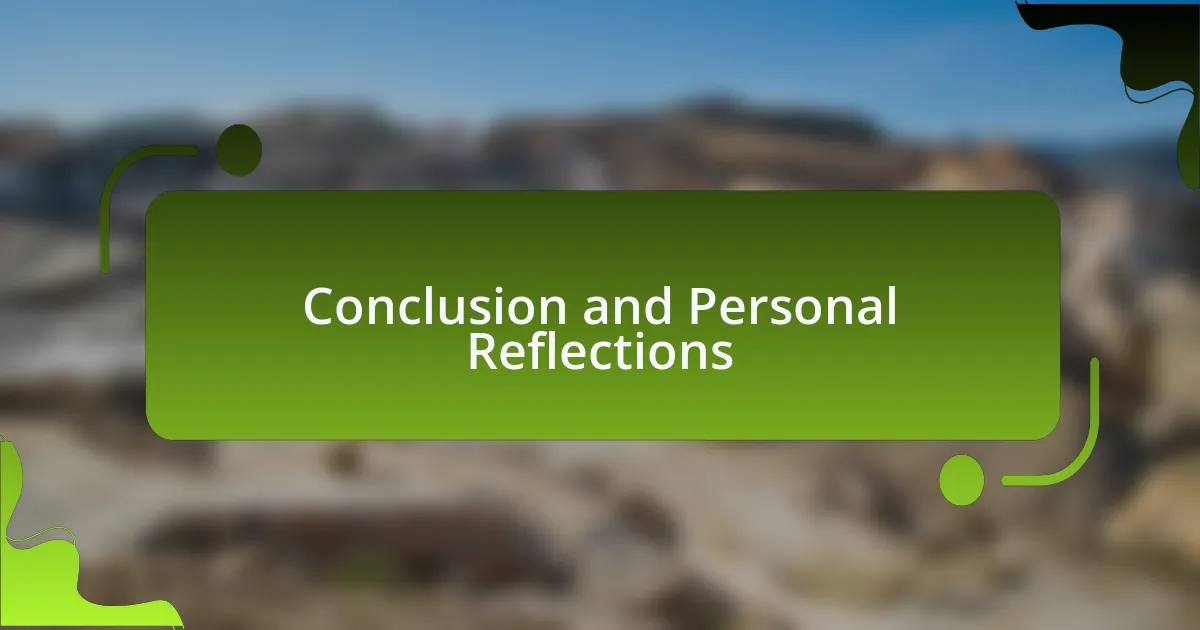
Conclusion and Personal Reflections
As I look back on my journey with VPNs, I realize how transformative they have been for my online experience. Initially, I viewed them merely as tools for privacy, but over time, I recognized their importance in granting me the freedom to explore content without restraint. Have you ever felt the frustration of being blocked from accessing your favorite videos or articles? That moment of unblocking is truly empowering.
Reflecting on my own experiences, I now prioritize not just privacy, but also the user experience. There was a specific instance where I had to stream an important live event and opted for a VPN. My heart raced as the connection faltered, but I had ensured I was on a server close by, and thankfully, it held firm. Nothing compares to that feeling of relief when you know you’ve made smart choices to safeguard what matters.
Ultimately, I’ve come to appreciate the blend of security and usability that a good VPN brings. It’s about balancing the need for protection with the enjoyment of the online world. When was the last time you felt that sense of balance? Embracing these tools has made me more mindful of my digital footprints, and I encourage others to explore the benefits of VPNs with an open mind – it’s a worthwhile journey.